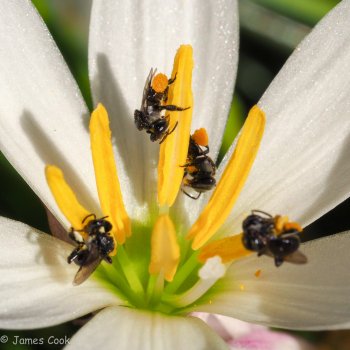
Hort Innovation and Western Sydney University recently launched a project to investigate stingless bees to ease Australia’s dependency on the European Honeybee – a pollinator that is vulnerable to threats, particularly Varroa Mite. While the mite has not yet taken hold in Australia, if it does, scientists expect it may cause the collapse of local honeybee populations.
Hort Innovation R&D general manager David Moore said there is strong industry support behind the initiative, which was made possible through vegetable industry levy funds, funds from the Australian Government, and co-investment from Western Sydney University.
“As an industry, horticulture is keenly aware that it needs to safeguard against any threats to the nation’s food crops and ensure the sustainability of Australian farms,” he said. “To help do this, we need to consider alternative pollinators, investigate their performance in different crops, and find better ways to propagate and deploy them.”
Moore said the leading candidates to ease the nation’s reliance on European Honeybees are stingless bees, which are easier to manage in that they do not sting, live in large colonies (like honeybees), pollinate a wide variety of plants, and can be kept in managed hives.
Lead researcher at Western Sydney University’s Hawkesbury Institute for the Environment Professor James Cook said there are a growing number of stingless beekeepers, and stingless bees are already used in macadamia farms, where they outperform honeybees.
“This research has the potential to change the way we view pollination in Australia. It is already clear managed stingless bees may have wide but underdeveloped potential for crop pollination,” he said. “Stingless bees are also used in crop pollination in several Asian countries – such as India and Thailand – and there is good scope to exchange knowledge and expertise on bee biology, husbandry and deployment in horticulture.”
Prof Cook said the project would comprise experimental studies on a range of fruit and vegetable crops (both tropical and temperate), testing first if the bees visit the flowers and transport the crop pollen.
“Investigating the effectiveness of stingless bee pollination and its impact on crop set, yield and quality will be the next steps,” he said. “For the most promising crop and bee combinations, we will then conduct more detailed studies to determine best ways to deploy managed hives within the target crop.”
Researchers will also study the potential of stingless bees to be effective managed pollinators in glasshouse conditions, utilising the newly launched National Vegetable Protected Cropping Centre located at WSU.
Vegetable grower Ed Fagan, who also travelled to India on the study tour, said the importance of pollination could not be overstated. “Seeing what has happened [in India], and seeing some of the data on what happens if your pollination isn’t one-hundred percent right made me realise how important pollination is. We should not be complacent.”
The Pollination Fund programme is supported by the Hort Frontiers initiative, a new investment model created by Hort Innovation to address critical issues facing the future of Australian horticulture.
Source: Hort Innovation



 Classifieds
Classifieds



